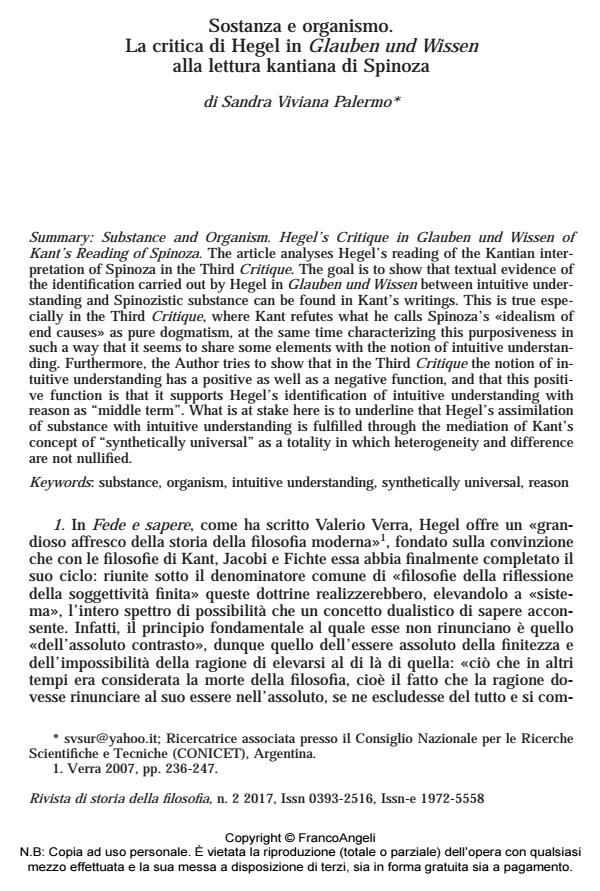Sostanza e organismo. La critica di Hegel in Glauben und Wissen alla lettura kantiana di Spinoza
Titolo Rivista RIVISTA DI STORIA DELLA FILOSOFIA
Autori/Curatori Sandra Viviana Palermo
Anno di pubblicazione 2017 Fascicolo 2017/2
Lingua Italiano Numero pagine 21 P. 245-265 Dimensione file 77 KB
DOI 10.3280/SF2017-002002
Il DOI è il codice a barre della proprietà intellettuale: per saperne di più
clicca qui
Qui sotto puoi vedere in anteprima la prima pagina di questo articolo.
Se questo articolo ti interessa, lo puoi acquistare (e scaricare in formato pdf) seguendo le facili indicazioni per acquistare il download credit. Acquista Download Credits per scaricare questo Articolo in formato PDF

FrancoAngeli è membro della Publishers International Linking Association, Inc (PILA)associazione indipendente e non profit per facilitare (attraverso i servizi tecnologici implementati da CrossRef.org) l’accesso degli studiosi ai contenuti digitali nelle pubblicazioni professionali e scientifiche
Substance and Organism. Hegel’s Critique in Glauben und Wissen of Kant’s Reading of Spinoza. The article analyses Hegel’s reading of the Kantian interpretation of Spinoza in the Third Critique. The goal is to show that textual evidence of the identification carried out by Hegel in Glauben und Wissen between intuitive understanding and Spinozistic substance can be found in Kant’s writings. This is true especially in the Third Critique, where Kant refutes what he calls Spinoza’s «idealism of end causes» as pure dogmatism, at the same time characterizing this purposiveness in such a way that it seems to share some elements with the notion of intuitive understanding. Furthermore, the Author tries to show that in the Third Critique the notion of intuitive understanding has a positive as well as a negative function, and that this positive function is that it supports Hegel’s identification of intuitive understanding with reason as "middle term". What is at stake here is to underline that Hegel’s assimilation of substance with intuitive understanding is fulfilled through the mediation of Kant’s concept of "synthetically universal" as a totality in which heterogeneity and difference are not nullified.
Parole chiave:Substance, organism, intuitive understanding, synthetically universal, reason
Sandra Viviana Palermo, Sostanza e organismo. La critica di Hegel in Glauben und Wissen alla lettura kantiana di Spinoza in "RIVISTA DI STORIA DELLA FILOSOFIA" 2/2017, pp 245-265, DOI: 10.3280/SF2017-002002